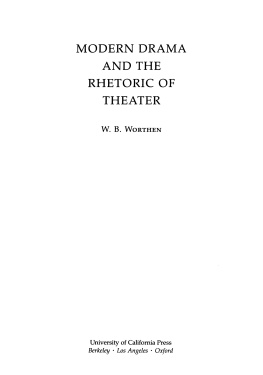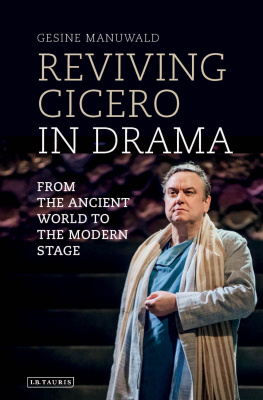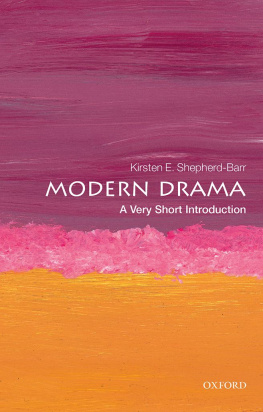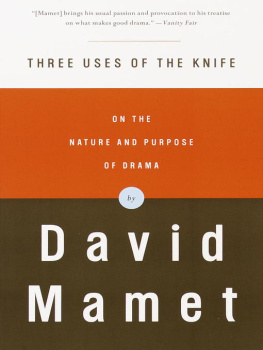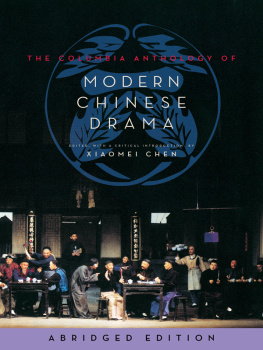MODERN DRAMA
AND THE
RHETORIC OF
THEATER
W. B. WORTHEN
University of California Press
Berkeley Los Angeles California
University of California Press
Berkeley and Los Angeles, California
University of California Press, Ltd.
Oxford, England
1992 by
The Regents of the University of California
First paperback printing 2015
Library of Congress Cataloging-in-Publication Data
Worthen, William B., 1955
Modern drama and the rhetoric
of theater / W. B. Worthen.
p. cm.
Includes bibliographical references and index.
ISBN 978-0-520-28687-0 (pbk.: alk. paper)
eISBN 978-0-520-96304-7
1. English drama20th centuryHistory andcriticism. 2. American drama20th centuryHistoryand criticism. 3. TheaterProduction anddirectionHistory20th century. I. Title.
PR736.W64 1992
822'.9109dc20
9117677
CIP
Contents
Acknowledgments
I have been at work on this book for some time, and am happy tohave the chance to record my gratitude to the many friends andcolleagues who offered help along the way. My sincere thanks toEnoch Brater, Oscar G. Brockett, Stanton B. Garner, Jr., CorinneJacker, Joan Lidoff, Theresa Kelley, Josephine Lee, Martin Meisel,Gail Kern Paster, Thomas Postlewait, Carol Rosen, and W. O. S.Sutherland for their support, encouragement, advice, and wisdom.Jonathan Freedman and the mountains of Vermont deserve aspecial word of thanks for so often clearing my mind. I am also gratefulto students and colleagues at the Bread Loaf School of English andto my students at Columbia and at Texas for sharpening mythinking about drama and theater. Doris Kretschmer of the University ofCalifornia Press has shown undue patience with my manyconcerns, and I am indebted to her, to Pamela MacFarland and EllenStein, and to the Presss readers for their attention and care.Audiences at Allegheny College, California State University atNorthridge, Columbia University, Duke University, Louisiana StateUniversity, the University of Michigan, and Northwestern Universitygraciously allowed me to try out some of these ideas on them.Finally, I could not have written this book without theconversation, confidence, and love of my wife, Denise Sechelski.
I am pleased to thank the John Simon Guggenheim MemorialFoundation for funding the leave of absence that enabled me tocomplete this work, and the University of Texas Research Instituteand the National Endowment for the Humanities for the grantsthat helped to get it started.
Portions of the third chapter are included in Murder in theCathedral and the Work of Acting, in T. S. Eliot: Man and Poet, ed. LauraCowan (National Poetry Foundation, 1990); the sections on Yeatsare adapted from The Discipline of the Theatrical Sense: At theHawks Well and the Rhetoric of the Stage, Modern Drama 30 (1987):90103, copyright the University of Toronto. Parts of chapter 4were adapted from Poppy and the Rhetoric of Political Theater,Genre 19 (1986): 17391, copyright the University of Oklahoma;and from Still playing games: Ideology and Performance in theTheater of Maria Irene Fornes, in Feminine Focus: The New WomenPlaywrights, ed. Enoch Brater (Oxford University Press, 1989),copyright Oxford University Press. My thanks to these publishers forgranting permission to adapt work I had originally published withthem.
Introduction
It is the spectator, and not life, that art really mirrors.
Oscar Wilde, The Pictureof Dorian Gray
This is a book about modern British and American drama, thesense of theatricality it demands, and the audience it both reflectsand creates. Indeed, the burden of the argument here is really aboutthis audience, about how modern drama and theater work to framethe audiences experience and to characterize its interpretiveactivities as an audienceto cast the spectators, so to speak, as part ofthe spectacle.
In the pages that follow I argue that the meanings of moderndrama cannot be fully seized without considering how thosemeanings are produced as theater. For in the theater, drama can speakonly through the practices of acting and directing, the constructionof the material space of the mise-en-scne, and the arrangementand disposition of the audience. We often think of these activitiesas free and unconstrained, as based on the unique insights of thetheaters practitioners. In practice, though, the theaters ways ofproducing texts on the stage tend to be highly formal; despite therange of personal choice that appears in any production, suchchoices emerge within the theaters systematic ways of putting thedrama into play. Not only are these practices specific to a givenmoment in history, they also have a manifestly rhetoricaldimension. The theater works to claim a certain kind of meaning for thedrama by claimingeven legitimatinga certain kind ofexperience for the audience as significant. The rhetoric of theater, that is,frames a relationship between the drama, stage production, andaudience interpretation, and it is within that relationship that ourexperience as an audience takes place.
The rhetoric of theater should be grasped not in terms of aspecific production, a given corpus of dramatic texts, or even featuresof theatrical style, but as what Laurence Olivier each invoked a different behavioral rhetoric, stageacting that not only conveyed markedly different ideas of action,character, and meaning, but also required different acts of attentionfrom their audiences. Training and technique provide theperformer with a paradigm both for interpreting the role (discoveringhow it is actable) and for representing it as theater. The rhetoricof acting frames our reading of the actors performance, and so thekind of character we can discover there.
The rhetorical character of acting is relatively plain to seemoreplain, certainly, than the activities of the audience. Much of this bookwill work to expose the similar rhetoricity of our performance in themodern theater, to ask how the audiences material and ideologicalpositioning by theatrical performance inflects its interpretivebehavior, its ways of seeing the fictions of the drama onstage. The moderntheaters history of innovation is directly concerned with producinga certain kind of experience for the audience, and so with producingthe audience itself. As Austin E. Quigley suggests, this historydescribes a movement away from a nineteenth-century tradition thatgave priority to entertaining and instructing audiences and towarda modern tradition
that gives priority to offering audience members the opportunity toparticipate in a particular mode of social inquiry. Such participationrequires audience members to respond to the challenge ofreconsidering their role as audience as a first step in reconsidering the nature ofthe theatre and the nature of the larger worlds in which they and itparticipate.
(5253)
Quigleys impressive reading of the interpretive andepistemological horizons offered and subverted by the modern drama, like finerecent studies by Anne Ubersfeld remarks that the spectator is lesujet dun faire, lartisan dun pratique qui sarticuleperptuellement avec les pratiques scniques (Lcole 303). Much as actorsrepresent characters, individuals are transformed intospectators through a specifically theatrical making and doing. Theiraffective and interpretive behavior is shaped not only by the drama butby the machinery of theatrical representation working on thedrama and on them.
Thematic readings of the spectator are corrected to some extent bymore symbolic inquiries into the theoretical status of an audience(such as Yettheater semiotics alerts us to an important truth about meaning inthe theater: meaning arises not through a given productions directreference to an external world, but through the productionsassertion of a set of available signifiers from the field of stylisticpossibilities. Even when a productions style most claims its likeness to life, itis marked by its difference from other stylistic resources that mighthave been used. In this limited sense, the various rhetorical modesof modern theatrical production function like signs. The meaning ofa given ensemble of practices and effects is discerned not byreference to the world it represents, but by its difference from otherensembles, other rhetorical modes.

